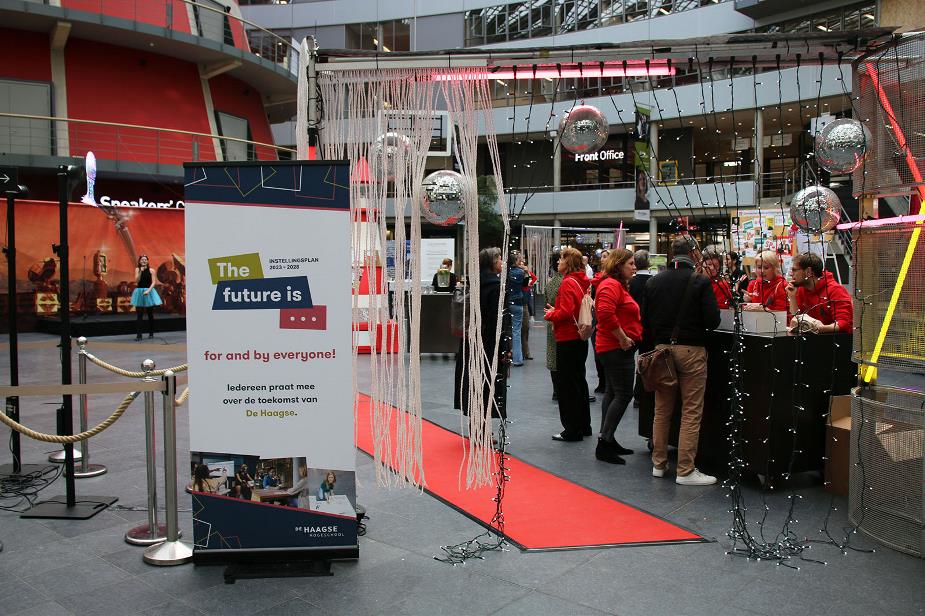Future Day takes THUAS to Mars

THUAS is opening a campus on Mars. On 17 March, students, staff members and external partners took a 'space-time journey' during Future Day. Purpose: brainstorming about the development of the institutional plan.
It is 2050. THUAS is opening a campus on Mars. On 17 March, students, staff members and external partners took a 'space-time journey' during Future Day. Purpose: brainstorming about the development of the institutional plan. ‘The Hague University of Applied Sciences provides excellent education related to our research and the outside world. But things can and should always be improved. And we determine these ambitions together with the entire university of applied sciences.’
The 2023-2028 institutional plan is about the future of THUAS. We used design thinking to create a participatory process that allowed everyone who studies or works at or with THUAS and our external stakeholders to think about this. ‘This institutional Plan will serve as a compass to further develop education and research at THUAS. Because everyone has the same goal: high-quality education and research. But how we get there is something we have to determine together. Together also with the outside world. That is why it was good to see everyone represented on Mars. Now it is a matter of bringing the roads together and starting to implement them,’ explains Executive Board Chair Elisabeth Minneman
Holograms
For the occasion, the THUAS lobby was transformed into a futuristic hall complete with holograms, a rocket and an opening act with an impressive red Mars photograph in the background. A flight attendant leads the participants into the room. ‘To explore the future of THUAS, we are collecting ideas that still seem impossible. That is why we leave the here and now and today's reality behind and travel to Mars,’ says project leader Jerry Snellink. The findings of the participants, lecturers, students and external guests will provide input for the Institutional Plan's project team.
Hammock
The expedition team consists of programme coordinator Mijke de Loor, management assistant Deborah Spinabelli, professor Laurence Guérin and internal communication advisor Janneke Platenkamp.
‘We went out to gather input. What does the future on Mars look like?’ The four heard from the hairdresser, a passing civil servant and a mover that everything would be robotised. They made a hammock for the exhibition in the Innovation Playground. ‘Our conclusion: no one needs to work anymore in 2050. There is no money and everything revolves around attention.
Uncertain
‘Whatever happens, one thing is certain: our only certainty is that the future is uncertain,’ states Executive Board member Rajash Rawal in conversation with other participants. ‘Look at the pandemic. You can only anticipate such an event to a certain extent. Uncertainty is normal, a part of everyday life. We must stop thinking that uncertainty is bad. It provides opportunities to grow and innovate.’ According to the Executive Board member, we too often think in terms of processes to solve problems, when we should be investing in our resilience and agility to deal with and solve those problems. ‘Above all, let's keep the goal in mind, knowing that more than one road leads to Rome.’
No right or wrong
And this uncertain future also applies to the way we provide education. Rajash: ‘Education is always focused on knowledge, when it would be better to focus on learning. There is no right or wrong. Of course 2 + 2 = 4, but there are different ways to get to the result. No path is the same.’ If it were up to the Executive Board member, THUAS would be focusing more on individual experiential learning.